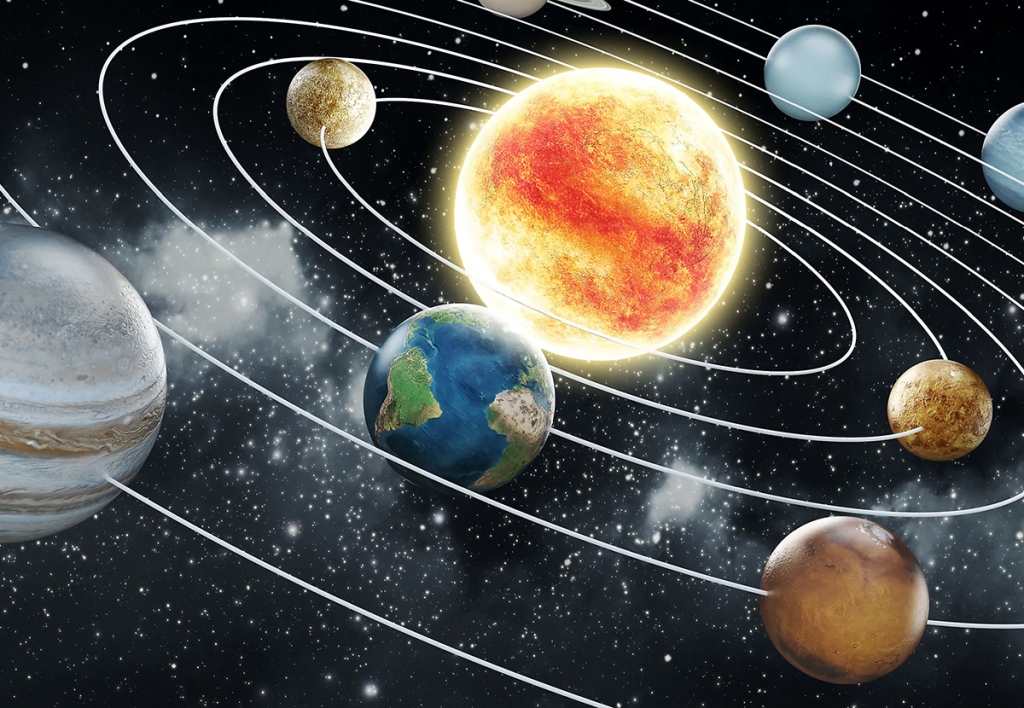
A magical evening at the Arts Centre, where I finally got to experience one of my all-time favourite classical suites, Gustav Holst’s The Planets.
The Planets of course represents the seven planets of the Solar System, absent Earth and Pluto, discovered a few years after Holst had already completed his masterpiece. It’s just as well that he never bothered to update the suite, since poor old Pluto was eventually downgraded to a dwarf planet and kicked out of the club.
I’ve always dreamed of hearing The Planets live, so this Melbourne Symphony Orchestra event was easily one of my most-anticipated concerts this year. But before we got down to business, there were a couple of appetisers. Opening the night was Elgar’s Cello Concerto, composed in the aftermath of the First World War, as I found out later. Though I’m not all that familiar with Elgar, I do love me some cello. This was a beautiful, contemplative piece, and the guest solo cellist gave an emotive and physical performance.
The second half of the program opened with Earth, a piece written by Deborah Cheetham Fraillon, Aboriginal Australian composer and soprano, who looked positively celestial in her stunning blue and orange dress. I enjoyed the composition, which moved from tension and drama to a more serene mood, but the decision to set it distinctly apart from Holst’s creation was probably correct, as it was clearly too much of its own thing.
Is there a more intense and ominous classical opener than Mars, the Bringer of War, a huge influence on modern film composers like John Williams and Hans Zimmer? With its aggressive, insistent military beat, it must be one of the heaviest and most metal pieces of classical music ever composed. You can practically see the giant armies march before your very eyeballs, and its famous ‘drop’ absolutely gave me the chills.
The angry red Mars is followed by the tranquility of Venus, the Bringer of Peace (let’s just ignore the fact that in reality, Venus is a toxic inhospitable hellscape with clouds of sulphuric acid). Usually, this is the movement I’m least excited about as it feels almost too relaxing for its own good. Live, however, I found a whole new appreciation for its delicate flutes and strings, with the orchestra bringing out the detail and beauty I haven’t quite noticed before.
The middle section of The Planets is tons of fun, with the flighty and lively piece dedicated to Mercury, named after the winged Roman god, and Jupiter, the Bringer of Jollity, probably the most famous movement. Truly epic and anthemic, it suggests a cheery uncle with a big booming voice and an outsized personality, giving hugs and presents to everybody. I wouldn’t necessarily say that brass section is my favourite part of an orchestra, but when it hits, it really hits.
The highlight of the concert for me was Saturn, the Bringer of Old Age, also Holst’s personal favourite. It’s a stark contrast to the exuberance of Jupiter, and to me the most emotionally charged moment, moving from the dread of the inevitable to the final calm acceptance. The mood then picks up again with Uranus, the Magician, which opens with sinister, imposing notes but then proceeds to sound more like an eccentric, bumbling wizard fussing around his laboratory.
As an aside, throughout the evening the audience seemed unsure of whether to clap after every movement was over, which was a tad comical. A piece with a big unambiguous finish like Jupiter would get massive applause, while at other times there would be dead silence with maybe one or two timid claps.
The night wrapped up with Neptune, the Mystic. Its influence may not sound as obvious as that of Mars, but it really feels like it echoes in the scores for modern science fiction movies, striving to capture the vastness and mystery of space that’s both terrifying and beautiful. Somehow, I completely forgot that it finishes with an ethereal female choir, and I had no idea that, as per tradition, the choir is supposed to be hidden from the audience. Those eerie disembodied voices really added to the mystical feeling of the movement.
All in all it was a powerful rendition of Holst’s magnificent suite. I can only hope that it won’t be too long until I have another chance to hear it live again. Recording is great and all, but nothing beats a live orchestra.
P.S. As I was driving towards the city in the evening, I noticed a noise all around me that sounded almost demonic… then I remembered that the Australian Grand Prix was on. Those guys are loud.
P.P.S. People who talk at the cinema drive me up the wall, but thank god the classical concert etiquette is still going strong. I had some very talkative couples sitting right behind me who chatted non-stop during the breaks, but they were just as reverently silent as everybody else during the performance.

